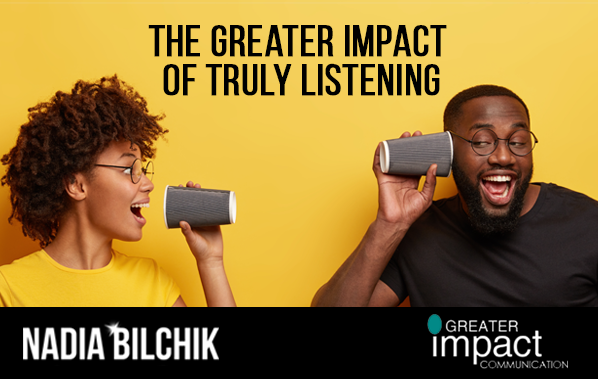
I recently had the wonderful opportunity to speak at TEDxEmory . The overall theme
was What Makes Your Heart Beat? My topic was Owning Your Confidence: How to
Overcome Nervousness and Exude Confidence in High-Stakes Situations. I discussed
several practical techniques to help you excel in even the most stressful of
situations. They are practices I’ve developed over many years of being on television
and speaking professionally around the world, and I will be sharing them all with
you here.
Last week, I explained the importance of building a Positive Emotional Memory
Database ™. This week, I want to discuss the importance of mastering your
listening skills and how doing so relates to building confidence.
When we think about demonstrating self-confidence, we often call to mind an image
of ourselves expressing an opinion or sharing an idea without doubting ourselves.
But showing genuine interest and really listening is equally critical.
When we show genuine interest in what others are saying, they tend to respond in a
positive way, letting us know either verbally or non-verbally that they feel heard
and understood. This positive feedback, in turn, helps us to feel more confident, and
that helps us to respond and speak in a more self-assured way.
So how do we practice effective listening? Here are a few tips.
1. As a psychiatrist and author M. Scott Peck says, set yourself aside. Be present at the
moment, and try not to become distracted by your own wandering thoughts or the
next items on your to-do list. Scientist Bill Nye reminds us to listen, knowing that,
“everyone you meet knows something you don’t”.
2. Ask open-ended questions. This gives the other person the opportunity to
elaborate on the subject matter they’re talking about, and to explain their thoughts
in greater detail. It will also give you a better idea of where they’re really coming
from, and what’s truly important to them about the topic you’re discussing.
3. Don’t make it about you. Providing a brief anecdote from your own life to show
that you relate to the other person’s experience can be helpful. But it should be
short, and you should quickly bring the conversation back to the other person’s
experience.
4. Listen with the intention of understanding what the other person is saying, not
with the intention of formulating your own response.
Try implementing these tips during a conversation you have today, and stay tuned
for the next technique!
The Greater Impact of Your Voice
The Greater Impact of Your Eye Contact



